
How Soliloquies Create Dramatic Irony in Plays: Unraveling Their Role and Impact
Ever watched a play and felt like you were in on a secret the characters didn’t know? 🎭 That thrilling tension comes from dramatic irony, and soliloquies are its master key! The function of soliloquies in creating dramatic irony lies in how they reveal a character’s hidden thoughts to the audience, leaving other characters clueless. Whether you’re a student decoding Shakespeare, a writer crafting stories, or a theater lover craving deeper insights, this article unravels how soliloquies spark suspense and emotion. Keep reading to discover practical tips for spotting and using this powerful storytelling tool! 😊
Table of Contents
ToggleUnderstanding Soliloquies and Dramatic Irony 🎭
To truly appreciate how soliloquies create dramatic irony, it’s essential to first understand what each term means—and how they work together to deepen a play’s emotional and narrative impact.
What Is a Soliloquy? 🗣️
A soliloquy is a speech delivered by a character who is alone on stage, speaking their thoughts out loud. It’s a direct window into the character’s mind—raw, honest, and unfiltered. Think of it like reading someone’s diary… except in real time.
Famous example? Hamlet’s “To be or not to be” speech. Here, the audience gets exclusive insight into his inner conflict—something the other characters don’t know.
What Is Dramatic Irony? 😮
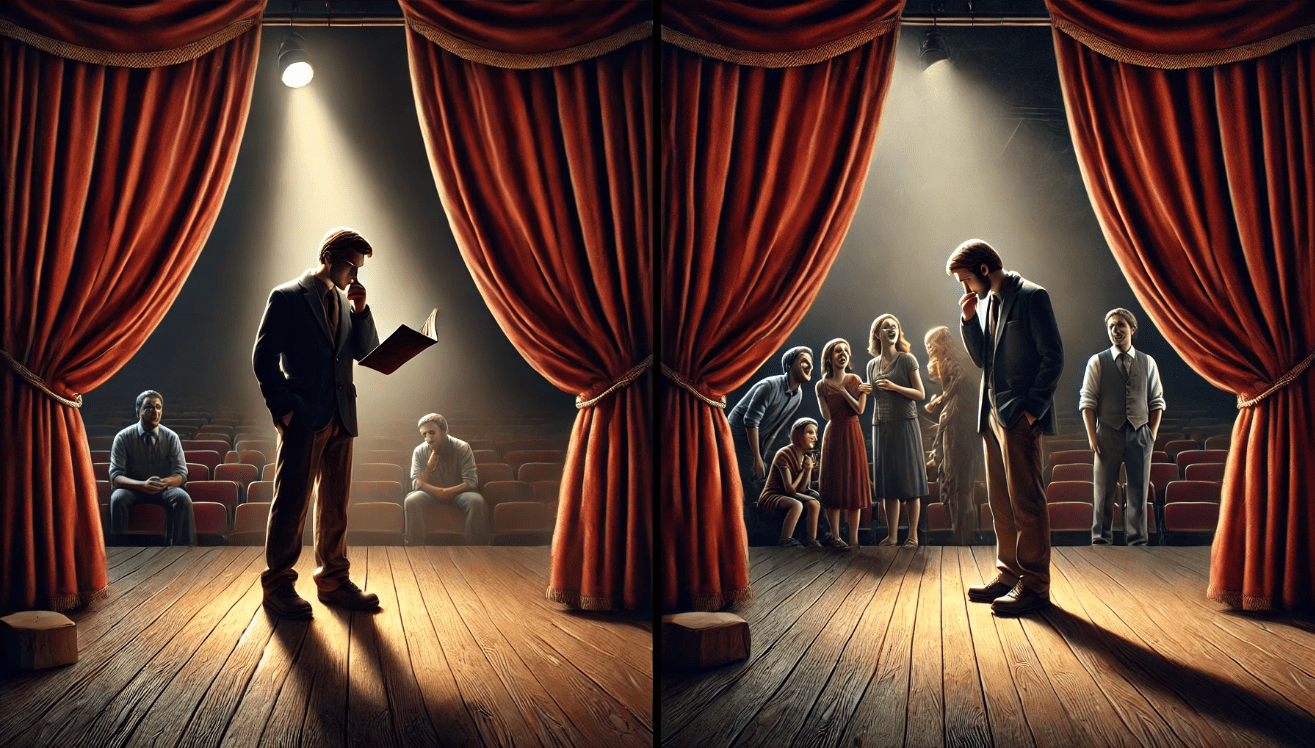
Dramatic irony happens when the audience knows something that the characters on stage do not. This gap in knowledge creates tension, anticipation, and often emotional involvement. It’s the storytelling secret sauce that keeps viewers hooked.
For example, in Romeo and Juliet, the audience knows Juliet is still alive when Romeo believes she’s dead. That painful awareness? Classic dramatic irony.
How Soliloquies Create Dramatic Irony 🔄
Soliloquies are one of the most powerful tools playwrights use to create dramatic irony. Here’s how:
- Revealing Hidden Intentions: When a character shares secret thoughts or plans, the audience learns things other characters don’t. This sets up suspenseful moments later in the plot.
- Building Emotional Connection: The audience often sympathizes with a character because they understand their struggles or desires—even when their actions seem questionable.
- Foreshadowing Plot Twists: A soliloquy can drop subtle hints that alert the audience to future events, creating tension and anticipation.
- Creating Moral Dilemmas: When viewers know a character’s true motives, it challenges their sense of right and wrong. This adds depth to the story and sparks conversation.
Real-World Impact for Writers and Performers 🎬
If you’re writing a play or performing one, understanding this relationship can dramatically (pun intended!) improve your storytelling:
- 🎯 Writers: Use soliloquies strategically to give the audience vital info without resorting to clunky exposition.
- 🎭 Actors: Deliver soliloquies with authenticity—they’re your chance to connect with the audience on a deeply personal level.
- 📚 Students & Readers: When analyzing a play, always ask: What does the audience know that other characters don’t? That’s your key to unlocking the dramatic irony at work.
The Mechanics of Soliloquies in Creating Dramatic Irony 🔍🎭
Now that you understand what soliloquies and dramatic irony are, let’s explore how soliloquies actually create dramatic irony in a play. This isn’t just literary theory—it’s a powerful storytelling technique with real impact. 💡
1. Soliloquies Give the Audience Insider Information 🧠
A soliloquy acts like a secret confession. Since it’s spoken directly to the audience, it reveals a character’s true thoughts, emotions, or intentions—often things they’re hiding from others.
👉 Why it matters: When the audience knows a character’s secret motivations before others do, it creates dramatic irony. Viewers sit in suspense, waiting to see how (or if) the other characters will discover the truth.
Example: In Macbeth, when Macbeth shares his thoughts about murdering Duncan, the audience knows what’s coming—even though Duncan doesn’t. That tension? Dramatic irony in action.
2. They Highlight the Gap Between Appearance and Reality 🎭
Characters often put on a public face that hides their real intentions. Soliloquies strip away the mask and show what’s really going on.
👉 Result: The audience knows what’s real while other characters are fooled by the act. This contrast between public behavior and private thoughts is where dramatic irony thrives.
Pro Tip: If you’re writing or performing, lean into this contrast. Show how differently the character acts when others are watching vs. when they’re alone.
3. Soliloquies Build Suspense and Emotional Involvement ⏳💔
Knowing something the characters don’t makes the audience feel powerless yet deeply involved. It keeps them on edge—especially if the character is about to make a big mistake.
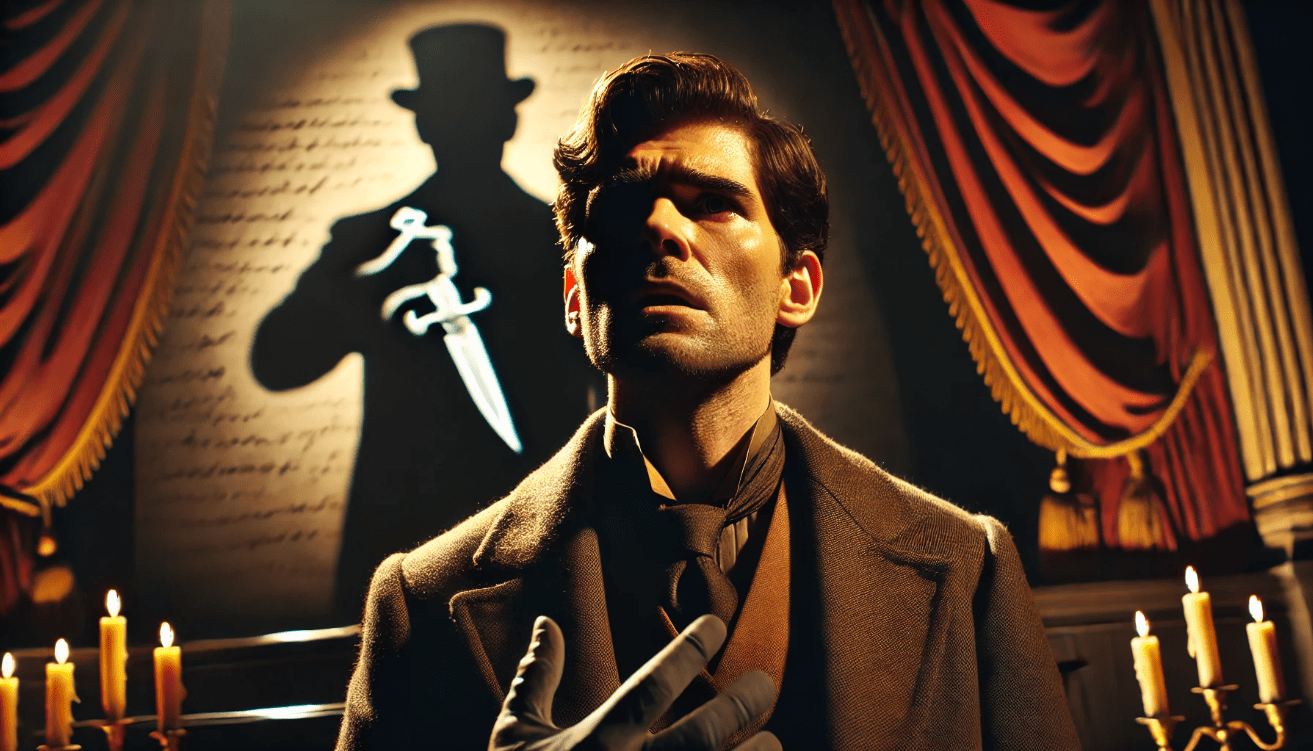
👉 Impact: Viewers aren’t just watching events unfold—they’re emotionally invested, shouting (internally), “No, don’t do it!”
Example: In Othello, Iago’s soliloquies explain his manipulative plan. The audience watches helplessly as Othello falls for the lies, knowing the truth all along.
4. They Enable Foreshadowing That Feels Personal 🔮
Soliloquies often plant clues about future actions or outcomes. But because they come straight from the character, they feel natural and personal, not forced.
👉 Why it works: Audiences don’t just know what might happen—they understand why a character is headed in that direction. This makes the eventual fallout more impactful.
5. They Turn the Audience into a Silent Confidant 🤫
In a soliloquy, the audience isn’t just watching—they’re being included. It’s like the character is letting you in on a secret. That personal connection amplifies the emotional punch of dramatic irony.
Why Soliloquies and Dramatic Irony Are Essential in Theater 🎭✨
Soliloquies and dramatic irony aren’t just fancy storytelling tools—they’re core elements of powerful theater. Whether you’re a playwright, performer, student, or theater lover, understanding why they matter can transform how you write, perform, or interpret a play.
Let’s break it down into practical, actionable insights you can apply 👇
1. They Deepen Audience Connection 🤝
Soliloquies give the audience direct access to a character’s inner world. Combine that with dramatic irony—where the audience knows more than the characters—and you create a unique emotional bond.
✅ Why it matters: This connection makes viewers feel like insiders. They’re not just watching the story; they’re emotionally invested in how it unfolds.
2. They Add Layers of Meaning 📚
Every soliloquy adds depth and subtext to the play. It lets characters say what they really think, while their actions or words to others may suggest something different.
✅ Why it matters: That contrast creates richer storytelling. The audience picks up on hidden motives, future conflicts, and subtle themes that might otherwise be missed.
3. They Build Tension and Suspense ⏳
When the audience knows more than the characters on stage, every decision, every moment, becomes more intense.
✅ Why it matters: This is the heartbeat of dramatic irony. It makes the audience lean in, whispering in their minds, “Don’t do it…” or “They have no idea what’s coming…”
Think of it as emotional fuel—it keeps the audience fully engaged.
4. They Showcase the Actor’s Skill 🎭🔥
A well-delivered soliloquy is a performance goldmine. It challenges actors to express raw emotion, subtle shifts, and inner conflict—all while holding the audience’s attention solo.
✅ Why it matters: For actors, mastering soliloquies can make or break a performance. For directors and writers, it’s a chance to spotlight a character’s depth.
5. They Drive the Plot Forward 🚀
Soliloquies often reveal decisions in real time. This not only creates dramatic irony but also propels the story.
✅ Why it matters: They’re not just introspective moments—they’re narrative tools that shape what happens next.
6. They Turn Passive Viewers into Active Participants 👀
When used well, soliloquies and dramatic irony invite the audience to think, question, and feel. They become part of the story’s moral or emotional journey.
✅ Why it matters: This is what makes theater unforgettable. It’s not just entertainment—it’s an experience.
Practical Applications of Soliloquies and Dramatic Irony 🎭✅
Soliloquies and dramatic irony aren’t just fascinating to analyze—they’re powerful tools you can use in your own creative work. Whether you’re a playwright, actor, director, student, or content creator, here’s how to apply these techniques in ways that actually work. 💡
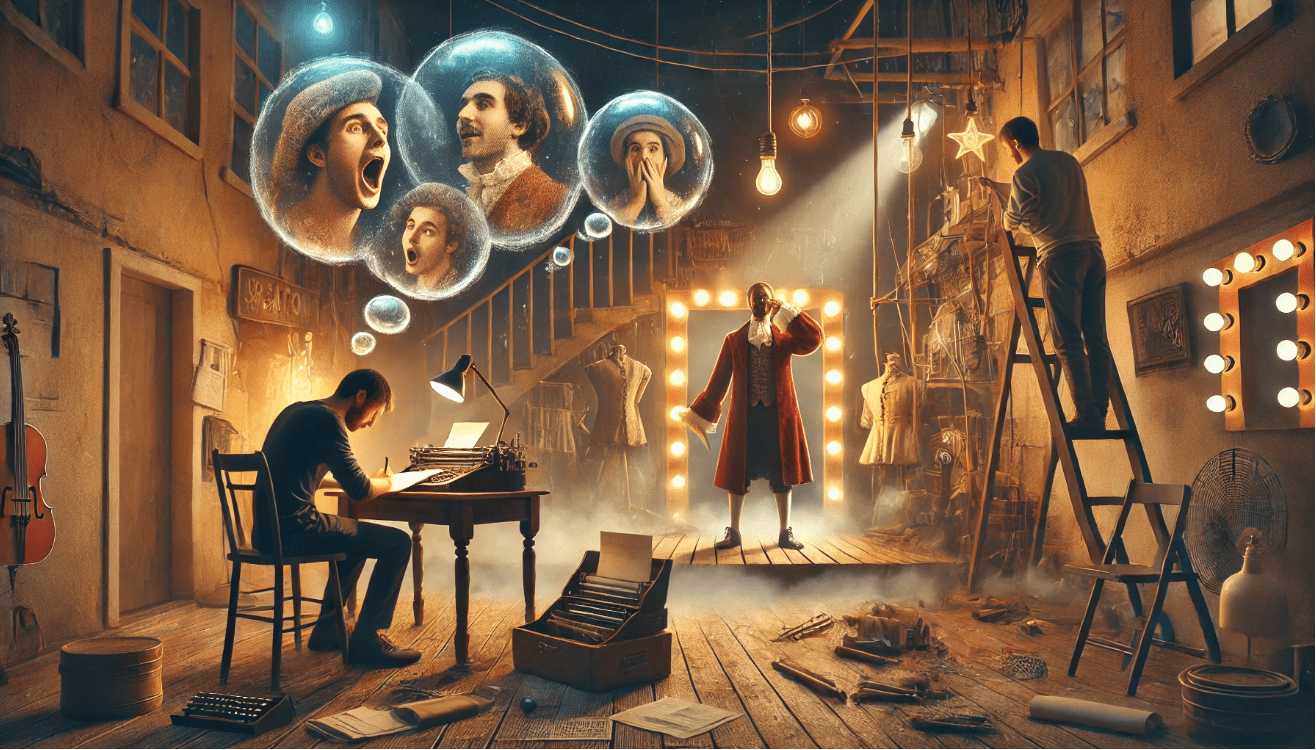
1. For Playwrights and Scriptwriters ✍️
Use soliloquies to reveal what can’t be said aloud.
Characters often wear masks in front of others. A soliloquy lets them drop that mask and speak the truth—about love, fear, betrayal, or revenge.
✅ Tip: Insert soliloquies at key turning points (before a big decision, after a major loss, etc.) to build dramatic tension.
✅ Bonus: Use the soliloquy to give the audience information that other characters don’t know—that’s where dramatic irony kicks in.
2. For Actors and Performers 🎤
Treat the audience like your confidant.
Soliloquies are your chance to speak directly to the audience, not just at them. Make it personal, honest, and emotionally real.
✅ Tip: Focus on emotional shifts within the soliloquy—where the character starts and where they end. That arc is often what creates the most impact.
✅ Pro Move: Use pauses, eye contact, and voice variation to draw the audience in and highlight moments of irony.
3. For Directors and Theater Teachers 🎬
Highlight contrast between public scenes and private soliloquies.
This helps the audience spot the dramatic irony and engage more deeply with the story.
✅ Tip: Use lighting, blocking, or staging to visually separate soliloquies from other scenes. This signals to the audience: You’re about to hear the truth.
✅ Idea: Encourage actors to treat soliloquies like private journal entries—intimate, vulnerable, and filled with subtext.
4. For Students and Critics 📚
Analyze how soliloquies create dramatic irony and character depth.
Looking to ace your essay or discussion? Focus on what the audience knows versus what other characters know—and how the soliloquy creates that gap.
✅ Tip: Ask yourself:
- What secrets are being revealed?
- How does this change how the audience views the character?
- What tension does this create in the story?
5. For Modern Storytellers and Content Creators 🎥🖋️
Adapt the technique into film, web series, or even social media scripts.
Soliloquies don’t have to be old-school. Think of voice-overs in film or direct-to-camera moments (like in Fleabag or House of Cards)—modern versions of soliloquies that build dramatic irony brilliantly.
Iconic Examples of Soliloquies Creating Dramatic Irony 🎭📚
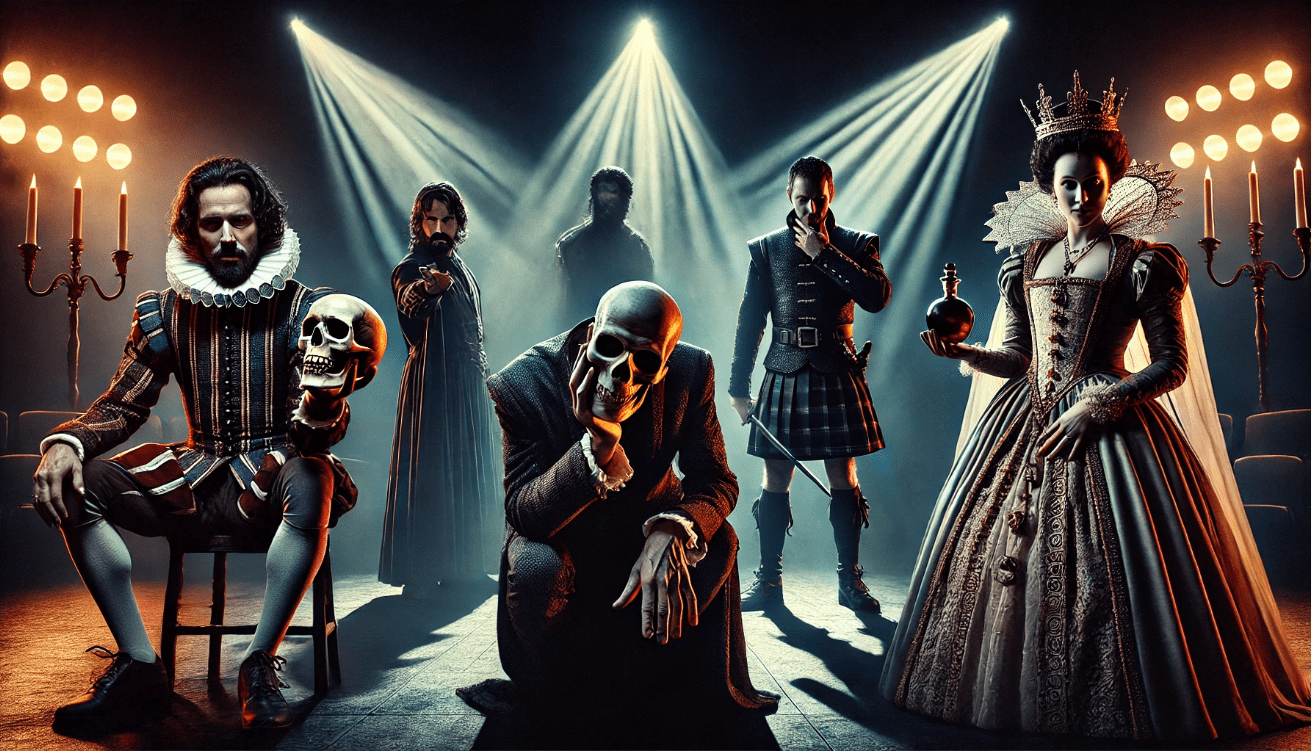
Some of the most unforgettable moments in theater come from soliloquies that create perfect dramatic irony—when the audience knows something crucial that other characters do not. Let’s explore a few iconic examples that show how master playwrights use this technique to build tension, emotion, and unforgettable storytelling. 💥
1. Hamlet – “To be or not to be” by William Shakespeare 🧠💀
In this legendary soliloquy, Hamlet contemplates life, death, and his inner turmoil. The audience sees the full weight of his despair and indecision—something other characters around him don’t understand.
2. Macbeth – “Is this a dagger which I see before me?” 🔪👑
Macbeth delivers this chilling soliloquy as he prepares to murder King Duncan. He wrestles with guilt and ambition, revealing his internal conflict.
3. Othello – Iago’s Soliloquies 🐍🎭
Iago is one of Shakespeare’s most manipulative villains, and his soliloquies are masterclasses in dramatic irony. He shares his evil plans directly with the audience, laying out every deceitful move.
4. Romeo and Juliet – Juliet’s Soliloquy Before Taking the Potion 💔💊
Juliet stands alone, debating whether to take the potion that will make her appear dead. She shares her fears, hopes, and love for Romeo.
5. Richard III – Opening Soliloquy 🦁👑
In the play’s opening, Richard reveals his villainous intentions: to manipulate, deceive, and climb to power. His honesty with the audience contrasts sharply with how he presents himself to others.
Clearing Up Common Misconceptions ❌🎭
When it comes to soliloquies and dramatic irony, a few misunderstandings often trip people up. Let’s clear the air so you can use—and interpret—these tools with confidence. 💡
#1: All monologues are soliloquies
Not true! While both are extended speeches, a soliloquy is spoken alone on stage, meant to reveal private thoughts. A monologue, on the other hand, can be directed at another character.
#2: Soliloquies are outdated
Nope! Soliloquies aren’t just for Shakespeare. 🎭 Today, they show up in modern plays, movies, TV shows, and even TikToks—think of voiceovers or direct-to-camera moments (like in Fleabag).
✅ Use It Today: In modern writing or performance, soliloquy-style storytelling creates a strong emotional connection and adds depth.
#3: Dramatic irony only happens in tragedies
Wrong again! While it’s powerful in tragedies, dramatic irony also adds tension, humor, or emotional impact in comedies and dramas alike.
✅ Think About It: Any time the audience knows something a character doesn’t—whether it’s funny, sad, or shocking—that’s dramatic irony at work.
#4: Soliloquies explain the plot
This is a common misstep in bad writing. A soliloquy shouldn’t just dump information—it should reveal what a character is thinking or feeling in a moment of honesty.
✅ Better Approach: Use soliloquies to explore doubt, desire, fear, or decisions. Let the audience connect with the character emotionally, not just intellectually.
#5: Dramatic irony makes the audience feel passive
Actually, it’s the opposite! Knowing more than the characters often makes the audience feel more involved, not less. It builds suspense, sparks emotion, and makes people care deeply about what happens next.
How to Analyze Soliloquies for Dramatic Irony 🕵️♂️🎭
Want to unlock the power of soliloquies and spot dramatic irony like a pro? Whether you’re a student, actor, or just love theater, learning to analyze soliloquies effectively will take your understanding to the next level. Here’s a clear, step-by-step guide to help you do just that. 😊👇
1: Identify the Soliloquy
Start by asking: Is the character truly alone on stage?
If yes, and they’re speaking their inner thoughts out loud, it’s a soliloquy.
✅ Clue: Soliloquies often begin when a character steps forward or when others exit, leaving them in silence to reflect.
2: Understand the Character’s State of Mind
What emotions are being expressed? Is the character:
- Conflicted?
- Angry?
- Grieving?
- Planning something?
✅ Why it matters: Soliloquies reveal hidden motives, fears, and desires—the things other characters (and sometimes even the character themselves) haven’t admitted out loud.
3: Look for Secrets or Intentions
Ask yourself: What does the audience learn in this moment that other characters don’t?
✅ This is where dramatic irony is born. If a character reveals plans, secrets, or internal conflicts that others are unaware of, the audience gains an “insider’s edge.”
4: Compare Public vs. Private Persona
Does the character act differently in public than they do in this soliloquy?
✅ Pro Tip: This contrast between appearance and reality creates deeper dramatic irony—and often foreshadows conflict or betrayal.
5: Predict the Inevitable Tension
Now that you know what the character is really thinking, consider how this knowledge sets up tension for what’s coming next.
✅ Ask:
- How will other characters react if they knew this?
- Is a disaster, reveal, or betrayal likely to happen soon?
- How does this make you feel as a viewer?
This builds suspense, which is the emotional core of dramatic irony.
Why Soliloquies and Dramatic Irony Matter More Than Ever 🎭✨
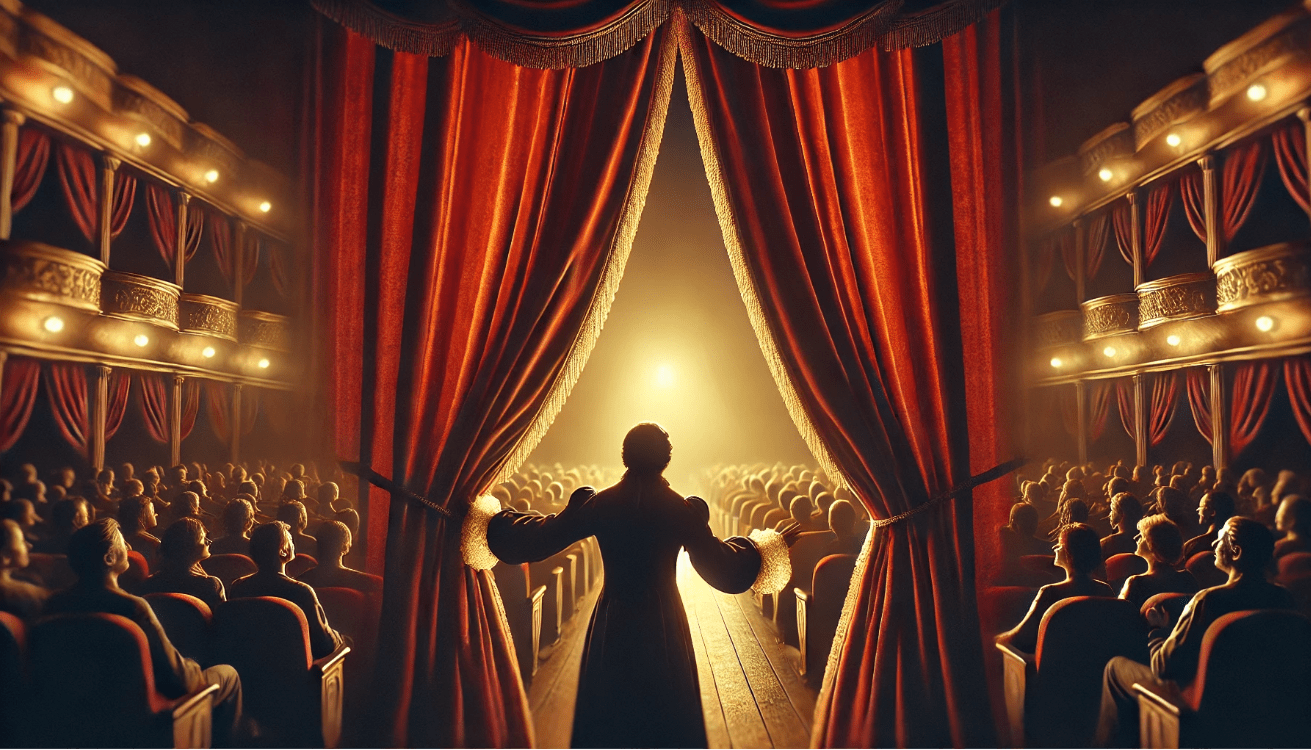
Soliloquies and dramatic irony aren’t just classic theater devices—they’re timeless tools that bring stories to life with depth, suspense, and emotion. From Shakespearean tragedies to modern dramas, these elements help reveal hidden truths, build audience connection, and create unforgettable moments on stage and screen.
When a character speaks their heart directly to the audience—and the audience knows more than the rest of the cast—it creates a powerful sense of anticipation and involvement. 🎬❤️
Frequently Asked Questions (FAQs)
1. What is a soliloquy in a play?
A soliloquy is a speech delivered by a character who is alone on stage, sharing their inner thoughts directly with the audience. It reveals what the character truly feels, thinks, or plans—often things they wouldn’t say to others.
2. How does a soliloquy create dramatic irony?
Soliloquies create dramatic irony by giving the audience information that other characters don’t know. This knowledge gap builds suspense and emotional engagement as viewers anticipate how or when the truth will come out.
3. What is an example of dramatic irony in a soliloquy?
A famous example is in Macbeth, when Macbeth reveals his plan to kill King Duncan. The audience knows his intentions, while Duncan remains unaware—creating intense dramatic tension.
4. Are soliloquies still used in modern theater or film?
Yes! Soliloquies appear in modern forms like voiceovers, direct-to-camera talks, or inner monologues in TV and film. Shows like Fleabag and House of Cards use this technique to connect the character directly with the audience.
5. What’s the difference between a soliloquy and a monologue?
A soliloquy is spoken when a character is alone, revealing private thoughts. A monologue is a long speech that can be addressed to other characters. Both are dramatic tools, but soliloquies are more personal and introspective.
6. Why is dramatic irony important in storytelling?
Dramatic irony builds tension, engages the audience, and makes them feel involved in the story. It can create suspense, deepen emotional impact, and make scenes more memorable and meaningful.
7. How can I identify dramatic irony in a play?
Look for moments when the audience knows something that the characters don’t—especially after a soliloquy or secret conversation. If you feel anticipation or tension because of this knowledge, that’s dramatic irony at work.
8. How can I use soliloquies effectively in my own writing?
Use soliloquies to explore a character’s inner conflict, reveal secrets, or foreshadow future actions. They’re most powerful when they give the audience insight that creates contrast with the character’s public behavior—setting the stage for dramatic irony.
